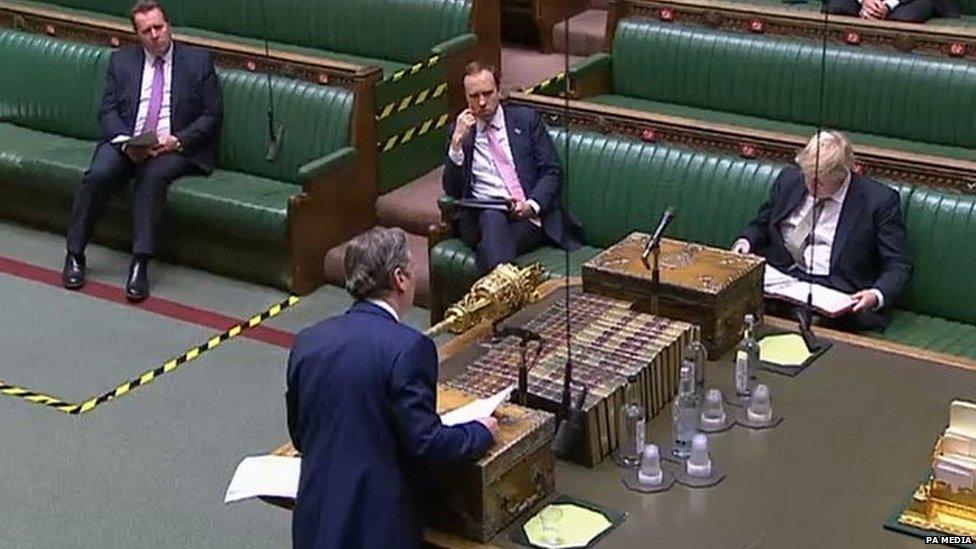Prime Minister's Questions: The lawyer versus the showman
- Published

Prime Minister's Questions is not exactly peak-time viewing.
But it matters because it is the one moment of the week when any prime minister has to front up and account for their government's actions.
Stand-out clips from the sessions quickly make their way online and into news bulletins.
And while week by week the occasion may not shift real votes decisively, the bout has a profound impact on how MPs feel about their leaders and a party's psychology.
And performance at PMQs is one of the threads that weaves the public's perception of a leader over time.
At any point then, the occasion of a new opposition leader facing the incumbent prime minister for the first time is a day to note. But in very strange circumstances today's face-off between Sir Keir Starmer and Boris Johnson followed the kind of script that the Labour leader's supporters might have hoped to write themselves.
For his supporters, Boris Johnson's talent is to display breezy energy and enthusiasm. For his detractors, that comes with a careless attitude to detail and risk of complacency.
Sir Keir Starmer says the UK's coronavirus death figures are “not success or apparent success“
Boris Johnson says some lockdown measures could change on Monday
Sir Keir Starmer's backers believe his strength is his calm and sober approach and focus on detail.
For his critics though, all that seriousness damps down the possibility of fireworks. For the opposition to blast through the noise at Westminster, passion as well as policy matters a lot.
The Labour leader has, since he took over, inched rather than sprinted towards confrontation with the government, trying to be seen to be constructive rather than obstructive at a time of emergency.
But with the UK's death toll grimly passing Italy's, giving the country the second highest number in the world at the moment, Starmer opened his questions with a simple question but one that may be on many minds - "how on earth did it come to this?"
In his defence, Boris Johnson repeated what we have heard from other ministers in the last few days - that international comparisons are difficult, that it may be some time before there are definitive numbers.
That is true, for all sorts of different reasons - different populations, different population densities and demographics, different ways countries compile the statistics.
But the numbers can't be dismissed as simply irrelevant, not least because the government itself has been publishing them publicly every day at their Number 10 briefing.
And also because early on the chief scientific adviser, Sir Patrick Vallance, suggested there was the possibility, if the pandemic was handled well, that deaths here could be kept to 20,000.
We are now well past that figure and are nowhere near the end.
The Labour leader came armed with questions on the number of deaths, and on testing and care homes too, using the government's own slides as props to wave around at the despatch box to back up his detail.
The prime minister expressed "bitter regrets" about what is happening in care homes, and said he was "enraged" by the problems there have been with PPE. He also confirmed that on Sunday he'll outline the roll-back from the lockdown, with some tweaks possibly coming into force from Monday.
But it was obvious at times that Boris Johnson was flustered, repeatedly looking around and over his shoulder where his cheering backbenchers would normally be. In the weirdly empty chamber most normally eager Tories were looming on video screens far above - there was no comfort there.
Labour's sparse front bench sat shaking their heads as the answers emerged, while the near empty chamber rather seemed to suit their leader, the former barrister.
If and when Parliament ever returns to normal, he'll have to compete with a wall of sound. As Jeremy Corbyn discovered to his cost, the despatch box can be an unforgiving place.
And an opponent with a generous cushion of a 80-seat majority and with no real internal rivals won't be easily felled.
But we've now had our first glimpse of the direct contest - the lawyer versus the showman - that ultimately the public will decide.
